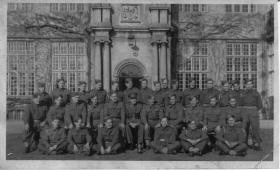Frank Bentley initially enlisted with the Grenadier Guards in 1928 before being transferred to the Royal Regiment of Artillery on 6th March 1928. He spent three years with the Artillery, including two years in Egypt, before leaving the Army for the reserve list in the early 1930s.
At the beginning of the Second World War, he was recalled to colours and joined the British Expeditionary Force in North-West Europe as part of 210 Battery, 53rd (Worcester Yeomanry) Anti-Tank Regiment. Promoted to Lance Bombardier in March 1940, he remained in Europe before extraction from Dunkirk (La Panne) after fighting rear guard action with 210 Battery.
In August 1940 he attained the rank of Bombardier, and was promoted to Sergeant in mid-October of the same year. Records of his promotion to Warrant Officer Class II are less clear. By deployment back to Europe in mid-1944, he may have held the rank for two years after an initial 'field' appointment.
When the 6th Airborne Division was initiated in 1943, the 53rd Worcester Yeomanry RA became 53rd (Worcester Yeomanry) Airlanding Light Regiment, and so 210 Battery became an Airborne unit.
Frank Bentley returned to North-West Europe as an Airborne soldier during Operation Overlord (although records of his insertion date are confused - his paybook shows 9th June 1944, but the war diaries record 13th June). He returned home to the UK, in September 1944. He went on to take part in the Ardennes campaign, re-entering Northern Europe on 24th December 1944, and returning to the UK in February 1945.
His final Airborne campaign came shortly afterwards as 6th Airborne re-entered Europe for Operation Varsity. Frank Bentley headed to the Rhine Crossing on 24th March 1945, onboard a Horsa glider. The Horsa crash-landed off target, killing the pilot(s) and gunners onboard. Frank Bentley himself was wounded and subsequently taken prisoner for 6 days.
He was finally discharged from the services on medical grounds in July 1946, with a series of wounds including a machine gun bullet through the wrist, and shrapnel embedded in skull. He finished as Battery Sergeant Major (BSM), Warrant Officer II for 210 Battery.
After leaving the Army, Frank spent many years as Chairman of The Manchester Branch of The Dunkirk Veterans Association, and was a member of the Worcester Yeomanry Association. The accompanying photograph of A Troop, 210 Battery is actually taken before the 53rd became part of 6th Airborne Division (as can be seen from the insignia etc.).



Latest Comments
There are currently no comments for this content.
Add Comment
In order to add comments you must be registered with ParaData.
If you are currently a ParaData member please login.
If you are not currently a ParaData member but wish to get involved please register.